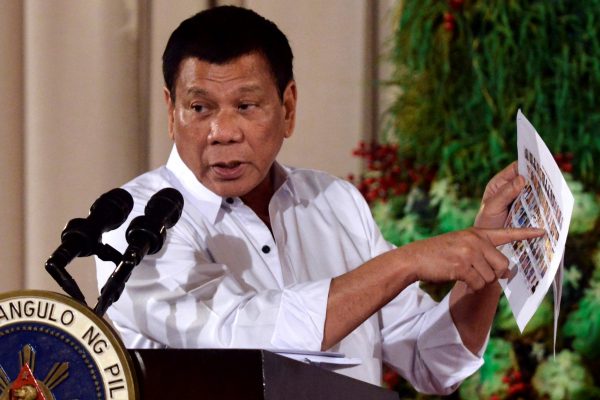Instead, three candidates, then incumbent vice president Jejomar ‘Jojo’ Binay, incumbent Senator Grace Poe and Davao City mayor Rodrigo Duterte, had greater chances of grabbing the presidency. The first two were hounded by controversies: Binay over serious allegations of corruption and Poe over questions concerning her citizenship. By early March 2016, Duterte appeared to have distanced himself from the other candidates.
With a populist slogan, Tapang at Malasakit (Courage and Compassion), Duterte elevated a pervasive issue, the proliferation of illegal drugs, as an urgent national concern. In his campaign, he promised to eliminate, even kill, drug lords and pushers within six months after his election as president. Despite controversial statements, from cursing the Pope to joking about the rape of an Australian missionary who was murdered in the late 1980s, Duterte continued to draw significant support. This was in a large part due to his ‘no nonsense’ style and record of delivering on his promises to uphold peace and order as mayor of Davao City.
As expected, the presidential election results delivered a victory for Duterte. Duterte garnered close to 40 per cent of the popular vote, trailed by Roxas and Poe. Bolstered by the significant support he obtained, Duterte quickly put into motion his campaign against illegal drugs, with a program labelled Operation Tokhang (Operation Knock and Plead). The operation empowers the national police to visit communities, round up drug suspects and encourage them to surrender and commit to mending their ways.
From 1 July until the end of November, the crackdown netted more than 800,000 surrenders and, more alarming, over 5000 deaths. The fatality count has led critics to raise the issue of extrajudicial killings, an allegation quickly dismissed by Duterte and the leaders of the national police.
In rationalising the campaign, Duterte has repeatedly argued that his administration is trying to prevent the country from becoming a narco-state. In many of his speeches, Duterte alleges that the threat of narco-politics is imminent, pointing to the number of national and local officials who have benefited from support from illegal drug syndicates and who in turn protect these syndicates. Among national politicians, Duterte and his cohorts have singled out national legislator, neophyte Senator Leila de Lima, the former Justice Secretary under the Aquino administration and the former Chair of the Commission on Human Rights as being implicated in narco-politics.
The allegations against De Lima are controversial. On De Lima’s urging, two Senate committees had started to investigate alleged extrajudicial killings in early August 2016. Unfortunately, a month and a half after the hearings started — and after De Lima summoned a witness who validated the existence of the alleged ‘Davao Death Squad’ — De Lima was removed from the position of Chair of the Justice Committee by a majority of her peers in the Senate, allegedly because of her bias.
Alongside the Senate’s investigation of extrajudicial killings, the Lower House had also been conducting its own investigation on the proliferation of the illegal drug trade in the national penitentiary. In October, witnesses in the Lower House hearings — mainly maximum security convicts as well as former law enforcement agents — alleged that De Lima was on the take. De Lima’s fate suggests that countering the all-out war against illegal drugs could be personally risky. Senator Poe has described the personal vilification De Lima has faced as part of the last Lower House hearing as reaching the level of ‘national voyeurism’.
De Lima is not the sole recipient of Duterte or his supporters’ wrath. He has threatened to kill human rights workers and, most recently, conveyed an order to two cabinet members to desist from attending the cabinet meetings. One of these cabinet members, Vice President Leni Robredo, took the text message relaying the order as the last straw, prompting her to resign from the cabinet.
Duterte has also criticised virtually every group that has raised human rights concerns over the drug crackdown: he has cursed the former US ambassador, the European Union, the UN Special Rapporteur on Human Rights and US President Barack Obama. In his pronouncements, Duterte accused Western leaders and organisations of ‘hypocrisy’, recounting stories of injustice committed by the United States during its colonisation of the Philippines as well as the death toll from the Western-led campaigns against alleged weapons of mass destruction in Iraq and Islamic extremism in Syria.
As further evidence of the United States’ allegedly duplicitous character on human rights and climate change issues, Duterte has underscored that the United States has not ratified either the Rome Statute of the International Criminal Court or the Kyoto Protocol. At the same time, Duterte has committed to extend the Philippines’ cooperation with non-Western countries, which he first declared in his visit to China and then again in his meeting with his ‘hero’ Russian President Vladimir Putin during the APEC summit.
With the Philippine president pivoting towards domestic campaigns to maintain peace and order as well as expanded relations with China and Russia, 2016 promises to be a turning point, signalling a slide towards illiberal politics. Based on the fatalities, physical and political, that the drug campaign has recorded, 2017 might bring another year of living dangerously for the Philippines.
Ronald D. Holmes is a Research Scholar in the Coral Bell School of Asia Pacific Affairs at the ANU.
This article is part of an EAF special feature series on 2016 in review and the year ahead.

